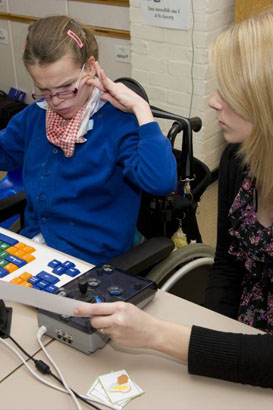In a study of neuro-typical children, Taggart et al (2005) point out the importance of words related to metacognition (knowing about knowing) if thinking is to be encouraged; they recommend practising regularly using words such as think, know, guess, remember, forget, mean, if, because, why.
Children who are at very early levels of language development need to relate the words they use to a meaningful context (Hinchcliffe, 1991). For those with learning difficulties, this will mean practising using the words inside phrases such as, ‘I know that it is assembly next’, or ‘If I go out without a coat, I’ll be very cold’.
Hinchcliffe and Roberts (1987) used a similar approach, but concentrated on using the words in games, story scenarios and dramas. Their research with children with SLD and non-learning disabled children indicated that language relating to intentions, desires, beliefs and feelings was significant in developing children’s problem-solving and self-advocacy skills.

Hinchcliffe and Roberts analysed parental reports of the spontaneous language of a group of children with Down’s syndrome aged between two and eleven. They found a paucity of mental state language used by the children. Preliminary findings from Hinchcliffe’s follow-up study (1995) investigating the frequency and type of internal state language (words that refer to intentions, cognitions and feeling states) among children with SLD showed a similar poverty of internal state language. Hinchcliffe (1994, 1995, 1996, 1999) found certain teaching strategies to be effective in teaching 'target' words which were used to develop children's conscious awareness of mental events and feelings, as well as the ability to talk about them.

Collis, M. and Lacey, P. (1996), Interactive Approaches to Teaching, London, David Fulton.
Hinchcliffe, V. (1991) Two stages in the process of learning to read: Implications for children with severe learning difficulties in Smith, B (ed) Teaching the Core Subjects through Interactive Approaches. Bristol. Lame Duck Publishing.
Hinchcliffe, V. and Roberts, M. (1987)Developing social cognition and metacognition, in Smith B (ed) Interactive Approaches to the Education of Children with Severe Learning Difficulties, Birmingham, Westhill College.
Hinchcliffe, V. (1994) A special special need: self-advocacy, curriculum and the needs of children with severe learning difficulties, In Sandow, S. (Ed.) Whose Special Need? London, Paul Chapman Publishing.

Hinchcliffe V (1995) The social-cognitive development of children with severe learning difficulties, Unpublished PhD thesis, Brunel University.
Hinchcliffe V (1996) Fairy stories and children's developing theories of mind, International Journal of Early Years Education, 4 (1) 35-46.
Hinchliffe V (1999) It All Comes Out in the Wash: Using TV 'Soap' with Pupils with Learning Disabilities in Fawkes S, Hurrell S & Peacey N (eds) Using Television and Video to Support Learning. London: David Fulton.